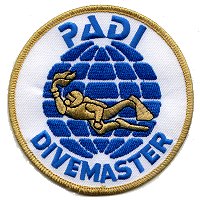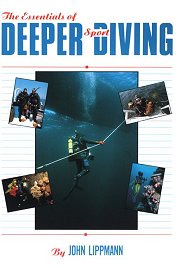Dive Training - Advanced

Moving on to the professional level, the lowest professional rating is Divemaster. I would hardly recommend doing this unless you are really interested in turning Pro - Divemaster is the longest and most arduous rating of all to get. The Divemaster course is like graduate school - a year or more of indentured servitude. On the other hand, pitching in with classes and other activities can be a lot of fun. Divemasters are the sergeants and mules of the diving world and carry out much of the tour-guiding, tank-filling, and grunt work at resorts and on dive boats. Beyond Divemaster, there is Assistant Instructor, which is basically gold-plated Divemaster, and then increasing levels of Instructor.

A common saying is "If you want to do a lot of diving, become a Divemaster. If you want to do a lot of crummy diving, become an Instructor." Instructor training is all about teaching beginner skills to students. Instructors tend to spend all their time in the pool and classroom, going over the same beginner's routine again and again and again. Often, this leaves little or no time to go out and actually do the very thing they are teaching - diving. On the other hand, if you love teaching then this may be ideal for you. A major and important difference between an Instructor and a Divemaster is that an Instructor is insured for the legal liability of supervising uncertified student divers, while a Divemaster is not.
In a very real sense, the training you get by following up the professional path to Instructor or higher is not making you a better or more experienced diver, but rather is just making you a more polished beginner. Most of the real screw-ups I have ever seen at sea were committed by certified Divemasters and Instructors ( including myself ) - so much for some of the practical aspects of that training! If you really want to learn how to dive for yourself, increase your safety and comfort levels, and expand your limitations as a diver, this is not the best route to follow.
Instead, to continue on to more advanced areas of diving, such as deep technical, wreck penetration, and "cave diving", you can turn to a technical diving organization such as TDI for real practical training in areas that the other organizations would like to pretend do not exist ( like overhead environments, decompression procedures, and solo diving. ) This is far better training for open ocean conditions than you would get in a cave-oriented DIR-F course. And finally, as in anything, there is simply no substitute for experience - if you want to become a better diver, then get out there, in the ocean, not the pool, and do it. A lot.
The practical advantage of becoming a Divemaster or higher is that you become a member of and fall under the protective legal umbrella of the certifying organization, and become eligible for legal liability insurance. PADI claims they have never lost a lawsuit. This can be important if you ever want to work in the industry, for example, as an instructor, or crew on a dive boat or at a resort. Any dive magazine will monthly catalog cases of poor and/or inexperienced divers who are injured or killed while committing the most incredibly stupid mistakes, who then turn around and sue everyone in sight. Such is the modern world. Locally, while the professional C-card may be important, your real experience will often be weighed more heavily.
I can say personally that crewing on a dive boat can be a lot of fun, and more rewarding than just being a passenger. And over the course of a season, you might make a few bucks ( post-dive bar tab, not much more ) instead of spending it, and do a whole lot more diving than you ever thought you might. However, the truth about a career in scuba is that nobody gets rich diving. In fact, around here, hardly anyone even makes a living at it. Almost all of the instructors and shop and boat owners that I know have day jobs that pay the bills. They do the diving business more for the love of it than the money. ( Gee, that's just like this website! ) Diving can turn a profit alright, but not enough to live on. It is possible to do somewhat better in the tropics, with the year-round season and tourism, but there the competition may be fierce, and your pay may be in pesos. Still, there is nothing better than turning your avocation into your vocation.
Jerry Seinfeld on Scuba Diving
Four diving instructors and their classes were on a boat that struck a rock and began sinking ...
The SSI instructor told his class: "Inflate your BCs and surface locator sticks, jump off and wait for the Coast Guard."
The YMCA instructor told his class: "You all had to swim 20 miles to qualify, the distance to the shore should be no problem, now jump in and swim!"
The NAUI instructor told his class: "We are the first and the best and the greatest! Everyone grab a woman in one arm and a child in the other and swim them to shore!"
The PADI instructor said: "Gear up and have a seat. There will be an extra charge of $50 each for this unscheduled wreck dive."
